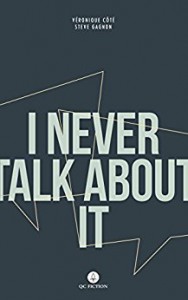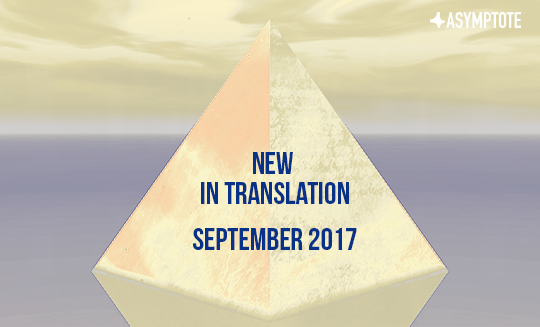Summer is drawing to a close and our bookshelves are groaning with the weight of new releases. Asymptote team members review three very different books—a genre-bending meditation on the practice of translation, a German bestseller about African refugees in Berlin, and an anthology of monologues that were once performed on the streets of Quebec City. There is much to delve into.

This Little Art by Kate Briggs, Fitzcarraldo Editions.
Reviewed by Theophilus Kwek, Editor-at-Large, Singapore.
It is in 1977, as he begins lecturing as Professor of Literary Semiology at the Collège de France, that Roland Barthes realizes he is no longer young: an “old and untimely body,” on a “new public stage.” But to speak to the students gathered—with their “new concerns, new urgencies, new desires”—he will have to “fling [himself] into the illusion that [he is] contemporary with the young bodies present before [him]”; he must, in Kate Briggs’s memorable words, forget the distances of age and time, and be “carried forward by the force of forgetting, which is the forward-tilting force of all living life.”
Briggs’s new book-length essay on translation, published this month by Fitzcarraldo (who surely must produce some of the most elegant books around) joins the ranks of treatises that ponder how we, as practitioners, should “properly register what’s going on with this—with [our]—work.” It’s an important question, she argues, not only because translation is a little understood (and hence undervalued) enterprise, but also because the process of translation itself sheds light on what it takes to make meaning, and art. Her answer, pursued over seven interlocking chapters, runs parallel to Barthes’s realization. Just as the old professor must “be born again,” translation is the work of making new: of bridging time and language to “make [literature] contemporary with [our] own present moment.”
Best known for her own translations of Barthes’s lecture notes (published as The Preparation of the Novel and How to Live Together), it’s unsurprising that Briggs’s text reads, in some ways, as an extended quarrel with Barthes himself. His observations—in particular about texts like The Magic Mountain and Robinson Crusoe—are presented for scrutiny, while some of Briggs’s own hurdles in translating him are laid bare for argument and illustration (“Why ‘preparation’ and not the more active ‘preparing’? Why not The Preparing of the Novel or even, more simply, Preparing the Novel?”) But she also draws upon a fine-grained selection of past and present writing, from personal correspondence between André Gide and his translator Deborah Bussy, to recent work by Lydia Davis and Anita Raja in Asymptote, and assiduously tests each of their perspectives against her own experience. The resulting insights, filtered as they are by analogy and anecdote through Briggs’s sensitive and deeply personal engagement with literary history, are instinctive, hard-won, and immediately persuasive.
This reader did, however, come away with one regret: the absence of any substantive exploration of non-European linguistic or literary traditions, beyond Barthes’s own obsession with and translations of Japanese haiku (from existing English translations). While Briggs’s arguments certainly endeavoured, and were in some measure able to put a finger on universal aspects of translating between historical and cultural moments, the voices of translators—and readers and writers more generally—of non-Western languages were few and far between. It thus felt, at certain points, as if she was unable to make a fuller reckoning of the power dynamics within and among tongues, which were invoked in passing, for example, when discussing the nuances of names and pronouns in English-language texts. Inevitably, this left an important work less expansive, and less powerful, than it could have been.
On balance, This Little Art is still a remarkable meditation that translates—that is to say, that renders contemporary—for the amateur and expert alike all the joys and tribulations of translation itself. It is exceptionally successful in rescuing from the margins the “little” (and frequently glossed over) considerations of the translator’s craft, relishing their particularities, and reinstating them as “art.” Though it does not present itself as a memoir, a how-to guide, or a scholarly monograph, the essay derives its magic precisely from being all of these and more: gifting us not only with a genre-bending work of imaginative criticism, but also a fitting metaphor for all that the work of translation is, and can be.

Go Went Gone by Jenny Erpenbeck, translated from the German by
Susan Bernofsky, New Directions (US) / Portabello Books (UK)
Reviewed by Madeline Jones, Editor-at-Large, U.S.A.
“Oceans rise / empires fall. / We have seen each other through it all,” King George sings in the musical Hamilton.
Our very coastlines are changing as sea levels rise, Russia annexed the Crimea, China is ever more intrusive in Hong Kong’s government, Catalonia continues its push to secede from Spain, Britain Brexited. Who is to say what the world map will look like in twenty years, in fifty years, in a century or two?
Yet Richard, an elderly classics professor living in Berlin who just amended an “emeritus” to his title—is keenly aware as he goes about his daily routine that countries are created and ownership defined arbitrarily. As a former resident of the German Democratic Republic (GDR), he lives near where the Berlin Wall once stood. He grew up, got married, and built his life in East Berlin in a house allotted to him by the socialist government. Then in 1989, in a matter of weeks, he automatically became a citizen of another country, had to buy the house he’d lived in for 20 years, and started using a transit stop on the other side of a now-defunct border, in a foreign country no longer foreign, to cut his commute time to the university in half. East Germans were told that the West Germans were their brothers.
Now Richard is not a socialist, a citizen of the GDR, or a professor. Childless, he hasn’t decorated the house for holidays since his wife died five years ago. One day, he sits on a bench in the center of the city where refugees from Africa have built tents and collect donations. They stage protests to claim their visibility. No one suggests they are brothers to the German people. They should solve their problems in Africa, people say.
Richard looks up a map of Africa and learns the names of countries he’s never noticed. He can recite Greek epics from memory, but he doesn’t know the capital of Niger. He has never heard of Burkina Faso.
He makes a list of questions: Where did you grow up? What’s you native language? What’s your religious affiliation? How many people are in your family? Armed with his research techniques and academic curiosity, he begins to visit the young men in a former nursing home repurposed by the government to temporarily house the refugees. He ends up asking few of his questions and getting much more complicated answers than he expected.
Go Went Gone takes its title from the verb conjugations the refugees—Richard’s new friends—practice in their German lessons, but the phrase also illustrates the refugees’ state of being. They have no future tense. When he sees them on their phones, “Richard notes that the men feel more at home in …wireless networks than in any of the countries in which they await their future. This system of numbers and passwords extending clear across continents is all the compensation they have for everything they’ve lost forever. What belongs to them is invisible and made of air.”
Erpenbeck’s last book, The End of Days, won the Independent Foreign Fiction Prize and the Hans Fallada Prize, and put the author on the literary map of the English-speaking world. That novel explores five possible courses the life of a woman born in Austria-Hungary could take, utterly absorbing the reader in a journey that traverses the length of the twentieth century. Go Went Gone starts off more slowly and covers less ground, pacing back and forth through Richard’s quiet life and internal ruminations. Frequent allusions to everything from Ovid to Hölderlin can bog down the narrative (our narrator is a life-long academic, after all), but once it takes off, Go Went Gone lives up to its title.
Erpenbeck masterfully confronts Europe’s refugee crisis through the lens of a well-meaning, though not always likable, character, who is all the more intriguing for being painted roughly and honestly. His attitudes are liberal but dated, his musings both professorial and naïve. Ultimately his generosity wins readers over, however, and Erpenbeck’s profound exploration of the concept of borders in all their forms makes this read both illuminating and touching. He asks, “What is the one true, crucial border? Perhaps the border between what is dead and alive? …Between one day and the next? Or between frogs and birds? …Or millions of times over between inside and outside, when you consider a single human being or a single animal or plant as a universe unto itself?”

I Never Talk About It by Véronique Côté and Steve Gagnon, translated from the French by thirty seven different translators, one for each short story, QC Fiction.
Reviewed by Chris Power.
Thirty-seven people from around the world each translated a chapter of Véronique Côté and Steve Gagnon’s Chaque automne j’ai envie de mourir. The book is a collection of short monologues “originally performed outdoors in Quebec City, with the audience literally [sic] wandering in off the street to a garden of secrets, then on to the next story somewhere else across town,” as Peter McCambridge, translator and fiction editor at QC Fiction, explains in the introduction.
The English translation is titled I Never Talk About It. As these monologues probe the limits of conversation (each character talks about what they never talk about), such public performances suit them; in this way they interrupt us while we are on the street, blabbering away, pretending to be people we are not.
The miracle of each of these monologues is that the characters verbalise effortlessly what they never tell anyone. What the monologists say is that they are not who they say they are. They give the lie to their identity and take off their human suit. Their words put them in question, like the never-writing writer of “Dishes,” who is tormented by other people’s belief that he is a writer. “I talk to people I don’t know. They look at me with admiration and it’s torture,” he says.
Everything falls between the lines. What these characters do not talk about is always the most important, especially when they repeatedly insist, like in the monologue “Looks,” that it’s “nothing,” “no big deal,” and “barely worth mentioning.” (The character in the end admits that his mother never told him he was handsome.) What the monologists never talk about lurks in the basic details of their existence. It slips out in the descriptions of their jobs, homes, families, or, in “Detective,” in the narrator’s description of her teeth which stick out of her mouth, “airing themselves.” Everything in their lives is in some ways designed to hide this gap, like the womanizing exploits of the narrator in “Looks.”
To translate thirty seven iterations of silence, the narrators and their many translators invent thirty seven dialects of a quotidian, unreflected, “natural” language that nonetheless holds the promise of self-knowledge and breakthrough. This promise is rarely realized, but its possibility is always present. For instance, after the narrator of “Couch” lists her many anxieties and then reasons that she can’t go to a psychologist because “I’m afraid I’ll find out who I really am,” she slips towards self-knowledge as she articulates her resistance to it. The speaker, in saying what she never says, breaks a rule that she has set for herself (breaking character, so to speak) thus making obvious her performance of herself. In “Wrestling,” the monologist articulates his love for his father that they have otherwise only expressed through wrestling each other. He would never say this “in real life,” but this love, translated through wrestling, defines him. A toxically masculine character admits in “Spasm” that he is building a bomb inside of himself because he is insecure about his height and his babyface.
These texts are also, as McCambridge suggests, perfect for demonstrating the praxis of translation. The translators are a diverse group, some not even French speakers. The biography of at least one, a faculty member at the Royal Military College of Canada’s French Department, goes so far as to claim, “Pierre-Luc Landry is not a translator.” McCambridge invites the reader to compare the translations, to consider different strategies taken by different translators, and to understand translation as a creative, and not merely an imitative, enterprise. The introduction includes no references to the content of the monologues, as if they have nothing to say about translation and have become merely material to translate. I’m not sure that the goal of showcasing the methodological variety and creativity of translation is accomplished. Texts that are more stylistically homogeneous would have better served that end.
Moreover, the blurbs at the end of each chapter that explain the translators’ approaches are not detailed, often only three or four sentences. The translators usually say that it was difficult to capture the style of the original. There seems to be a fixation on quantity (thirty seven!) that spreads too thin the juxtaposition of different methods and makes the book, in the end, unsuccessful as a reflection of the craft, but nonetheless an interesting work of literature that perhaps also has a bit to say about translation itself.
Imagining these perfect speech situations redraws the limits of the sayable. I would advise slow reading of these short chapters. In most a figure is drawn and erased in a single gesture.
*****
Read more reviews:

